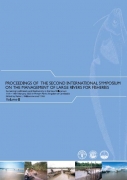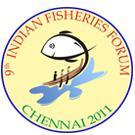Fisheries
Handbook of fisheries and aquaculture - New book released by Indian Council of Agricultural Research (ICAR)
Posted on 21 Mar, 2011 05:55 PMPatterns of diversity and conservation status of freshwater fishes in the tributaries of river Ramganga in the Shiwaliks of the Western Himalaya – A paper in Current Science
Posted on 20 Mar, 2011 09:47 PMOne tributary was within a protected area (PA; Corbett National Park); the other two were outside the PA (Lansdowne Forest Division). Cast nets were used for fish sampling, which was done from 9.00 a.m. to 5.00 p.m.
Temple fish sanctuaries: Last bastions of native fish and pristine river stretches - A report
Posted on 01 Mar, 2011 12:56 PM
Temple Fish Sanctuaries: Last bastions of native fish and pristine river stretches
Coastal Regulation Zone Notification 2011: Not the end of the road - An EPW paper
Posted on 01 Mar, 2011 11:59 AMIt falls short of offering greater protection to the coastal ecosystem, recognising the inalienable right of fisherfolk to their habitats and providing them with representation in decision-making.
Coastal Regulation Zone (2011) Notification, Island Protection Zone (2011) Notification and Traditional Coastal and Marine Fisherfolk (Protection of Rights) Act (2009) by the Ministry of Environment and Forests
Posted on 11 Feb, 2011 09:22 PMThe Coastal Regulation Zone (CRZ) notification of 1991 has been replaced recently in January 2011 by the latest CRZ notification of the Ministry of Environment and Forests (MoEF).
Proceedings of the second international symposium on the management of large rivers for fisheries by FAO and Mekong River Commission
Posted on 03 Feb, 2011 07:55 PM The second international symposium on the management of large rivers for fisheries was held by the Food and Agriculture Organisation of the United Nations (FAO) and Mekong River Commission on 11 - 14 February 2003 in Phnom Penh, Kingdom of Cambodia. It had three primary objectives: (a) To provide a forum to review and synthesise the latest information on large rivers; (b) To raise the political, public and scientific awareness of the importance of river systems, the living aquatic resources they support and the people that depend on them; and (c) To contribute to better management, conservation and restoration of the living aquatic resources of large rivers.
The second international symposium on the management of large rivers for fisheries was held by the Food and Agriculture Organisation of the United Nations (FAO) and Mekong River Commission on 11 - 14 February 2003 in Phnom Penh, Kingdom of Cambodia. It had three primary objectives: (a) To provide a forum to review and synthesise the latest information on large rivers; (b) To raise the political, public and scientific awareness of the importance of river systems, the living aquatic resources they support and the people that depend on them; and (c) To contribute to better management, conservation and restoration of the living aquatic resources of large rivers.
The symposium was organised in six sessions:
Session 1: Status of rivers
Session 2: Value of river fisheries
Session 3: Fisheries ecology and conservation
Session 4: Management of river fisheries
Session 5: Statistics and information
Session 6: Synthesis
It came up with the following recommendations for action -
- Improve the valuation of living river resources in order to contribute to equitable and sustainable management of fishery resources and properly place the fishery in the context of the other uses of rivers.
- Direct greater effort to better understanding the social and economic aspects of fisheries to support policy and management priorities; livelihood approaches will be a valuable tool.
- Communicate and engage with environment and water resources managers within the context of multi-use of water in order to accurately assess impacts and to sustain the benefits of river fisheries in an equitable manner.
- Develop processes that facilitate the users and beneficiaries of the fishery resource to assume greater control of its management.
- Establish appropriate mechanisms at national and basin level to enable negotiation for the needs of communities dependent upon the living aquatic resources. In particular further regulations need to be elaborated to protect general ecosystem function and provide for environmental flows.
- Use instruments such as the freshwater eco-regions approach, the Ramsar Convention and the guidelines for water allocation suggested by the World Commission on Dams, to enhance planning for conservation and sustainable use of river habitats.
- Incorporate ecological flow requirements of river-floodplain systems into development plans and impact assessments that affect river flows, taking into account the seasonality of the system and the environmental cues needed by the fish for migration and reproduction.
- Rehabilitate degraded ecosystems wherever possible. Prioritize schemes that ensure connectivity and protection of critical habitats.
Yale University releases Environmental Performance Indices for 2010
Posted on 30 Jan, 2011 11:47 PMThis website by the Yale University provides information on the global and countrywise ratings for environmental performance in the form of Environmental Performance Indices (EPI) for different countries. The site also provides details of EPI scores for India in comparison with the average scores globally.
This index was developed from the Pilot Environmental Performance Index, first published in 2002, and designed to supplement the environmental targets set forth in the U.N. Millennium Development Goals (http://en.wikipedia.org/wiki/Environmental_Performance_Index)
Regenerating natural resources and rural livelihoods in rainfed areas of India: A civil society consultation by WASSAN to discuss priorities for the twelfth five year plan
Posted on 26 Jan, 2011 09:13 PM A civil society consultation was held on “Regenerating natural resources and rural livelihoods in rainfed areas of India” by WASSAN at Hyderabad in December 2010 to discuss priorities for the twelfth five year plan. The Planning Commission, Government of India has been steering the process of development in India by conceptualizing five year plans and had sought inputs from civil society organizations, activists groups, networks of CBOs / NGOs, donors and others for preparing an approach paper for twelfth plan.
A civil society consultation was held on “Regenerating natural resources and rural livelihoods in rainfed areas of India” by WASSAN at Hyderabad in December 2010 to discuss priorities for the twelfth five year plan. The Planning Commission, Government of India has been steering the process of development in India by conceptualizing five year plans and had sought inputs from civil society organizations, activists groups, networks of CBOs / NGOs, donors and others for preparing an approach paper for twelfth plan.
The objective of the consultation workshop was to contribute to the process of defining broad contours of twelfth plan with a focus on rural livelihoods the thrust area being policy framework, funding support, institutional arrangements etc., by -
- Consolidating the lessons from good practices in promoting and protecting rural livelihoods in the country, that could be integrated in twelfth five year plan.
- Systematically articulating issues and concerns (bottlenecks) in promoting and protecting rural livelihoods, which could be addressed in the twelfth five year plan.
9th Indian Fisheries Forum, Central Marine Fisheries Research Institute, 19 - 23 December 2011 , Chennai
Posted on 20 Jan, 2011 05:12 PM
Organizer: Central Marine Fisheries Research Institute, Kochi
Venue: Indian Bank Management Academy for Growth & Excellence, Chennai
Ministry of Environment and Forests Announces Coastal Regulation Zone (CRZ), 2011 and Island Protection Zone, 2011 - PIB Release
Posted on 10 Jan, 2011 04:42 PMArticle Courtesy: Press Information Bureau
The Minister of State for Environment & Forests, Independent Charge Shri Jairam Ramesh today issued the following statement in a Press Conference in New Delhi. In the Press Conference, he announced Coastal Regulation Zone (CRZ) Notification, 2011 and Island Protection Zone (IPZ) Notification, 2011.




